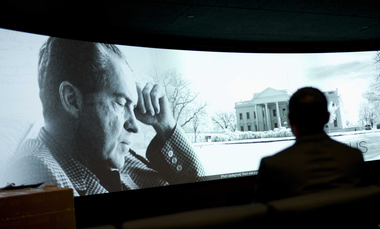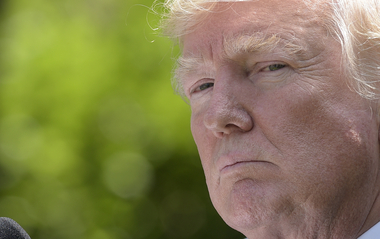Trump is constitutionally illiterate

by Rob Howard
Political Columnist
I remember, as if it were yesterday, sitting in my apartment in Frankfurt, Germany, waiting to hear the final unwinding of the Richard Nixon impeachment. It was August 8, 1974.
On July 24, the Supreme Court had said in a unanimous decision that Nixon must surrender the tapes and any other records of 64 White House conversations that might have a bearing on the guilt or innocence of defendants in the Watergate case.
According to a New Republic article in late August that year, “Eight hours elapsed between the announcement of the decision and the announcement by Mr. Nixon’s chief Watergate attorney, James D. St. Clair, that the President intended ‘to comply with that decision in all respects.’”
The critical point on Nixon’s mind after the decision was that he knew he was done. He knew there were six minutes in three recordings that showed he knew about the details of the Watergate break-in on June 23, 1972, six days after the event.
Even though Nixon knew in his heart that he was done, that didn’t prevent him from continuing to believe that he could beat the rap. The New Republic article recounts Press Secretary Ron Ziegler’s counterattack on the House Judiciary Committee.
Another statement from Ziegler said, “The President remains confident that the full House will recognize that there simply is not the evidence to support this or any other article of impeachment and will not vote to impeach. He is confident because he knows he has committed no impeachable offense.”
The slow dissemination of the bad news to top Nixon staff dribbled out over the next two weeks, with some staffers only finding out the gravity of the situation on August 5, when the June 23, 1972 transcripts were published.
None of the staff found it odd that, “President Nixon conferred in person only with Haig and Ziegler and met them separately, never together.”
The key instruction to speechwriters was “to admit nothing more than a few ‘mistakes of judgment’ and to avoid even the mild acknowledgement of guilt.”

Donald Trump has a lot to learn about presidential history. AP Photo, Susan Walsh.
I go through those details because what’s going on now in the White House bears eerie echoes of what happened to Nixon.
In my humble opinion, Donald Trump is [wrongly] smug in his belief that he is smarter than everybody else. That he can plow through any tough days in his administration. That he can ignore accepted Presidential protocol. He will never admit that he might have made a mistake.
He clearly knows nothing about presidential history, so he blunders along doing whatever he pleases. He is constitutionally illiterate in that he doesn’t even understand how the government is organized or what the significant limitations on his power are.
He doesn’t understand that every word uttered by the president means something and is important. That’s why presidents historically have had every speech, every comment, vetted, to make sure the president doesn’t go off text. Trump’s advisors must cringe every time he picks up his phone and pulls up the Twitter app.
After Trump’s tirades against judges and the judicial system in general, I cannot imagine him complying with a Supreme Court decision that turned against him. Even Nixon was smart enough not to do that. Trump is not.
Trump would rather lead the country into an unparalleled constitutional crisis than resign. And unfortunately, the GOP led Congress lacks the guts to stand up to him.
So when it comes time, he will take an impeachment through to trial and conviction. Hunker down, folks. It’s going to be a long, tedious and disheartening ride. It took over two years for Nixon to fall. We can’t yet know how long it will take Trump.
_
Copyright 2017 The Gayly - 7/16/2017 @ 8:49 a.m. CDT





